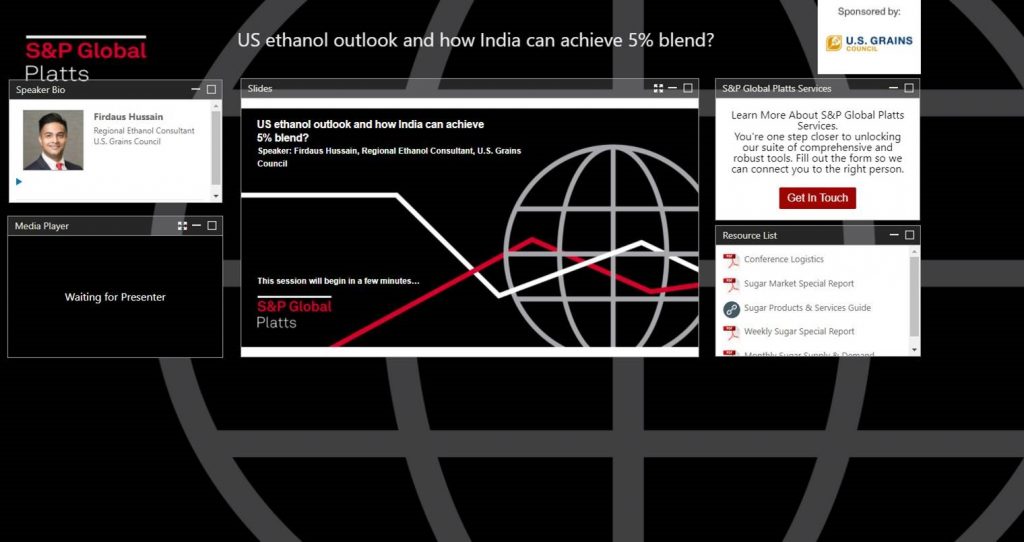Participation in a popular annual event for Indian ethanol producers allowed representatives of the U.S. Grains Council (USGC) to reinforce key points about the economic benefits of increased ethanol use and policies with a role for trade – ideas that were well-received and poised to propel renewed conversations in the market.
The S&P Global Platts Asia Sugarcane & Biofuels Conference brings together ethanol producers in India each year for the industry’s premier event.
“This is the mothership of ethanol and sugar events in the country,” said Alejandra Danielson Castillo, USGC regional director for South Asia. “We wanted to ensure the ethanol conversation remains at the top of the agenda with the Indian government.”
At the conference, the Council highlighted how India could move to a nationwide E10 blend mandate. India was the third-largest buyer of U.S. ethanol in the 2019/2020 marketing year at 194 million gallons, equivalent to 68.8 million bushels of corn. However, those imports were only for industrial uses. India’s current national biofuels policy does not allow ethanol imports for fuel use, though domestic ethanol production shortfalls can reach up to 571 million gallons per year for the fuel market.
The Council is working with the Indian industry to address the economic benefits of having a robust fuel ethanol policy, including the potential for imports to help the country meet its expanding national policy. These messages are shaping the Council’s plans for future promotions in 2021, focusing on trade policy work, support for policies that include a role for trade, and discussion on refinery operations, air pollution and industrial uses.
“This was a unique opportunity to talk about how ethanol imports have helped other economies like the Philippines and show the economic data supporting those messages,” Danielson Castillo said. “As with other markets, imports would backfill what the local industry cannot supply to meet their local policy and would add to the Indian economy.
“The concept of economic returns that help ensure a fully-met blend mandate is a compelling argument in favor of ethanol policies with a role for trade that complement the environmental benefits associated with greater use.”
The Council is continuing these discussions in 2021. During a virtual trade mission last week, Danielson Castillo spoke with the leader of the Indian Ministry of Road Transport & Highways, who visited the Council’s booth at the 2020 India Auto Expo. At that event, attendees learned about the economic, environmental and health benefits of increased ethanol use.
Danielson Castillo noted environmental benefits of ethanol have also gained traction following the early 2020 lockdowns during the COVID-19 pandemic. When traffic shut down, pollution levels in India dropped drastically. The tops of monuments normally covered by smog could be seen for the first time in decades. This visual has propelled conversations on air pollution, including the related environmental benefits of increased ethanol use.
Because India is a consistent top importer of U.S. ethanol for industrial uses, the Council is also exploring new areas of potential demand in the industrial use market.
“It’s a dynamic time to promote increased ethanol use in India,” Danielson Castillo said. “From fuel to trade policy to industrial uses – these areas will form the bulk of our focus this year.”
Learn more about the Council’s work to promote ethanol in India.
About The U.S. Grains Council
The U.S. Grains Council develops export markets for U.S. barley, corn, sorghum and related products including distiller’s dried grains with solubles (DDGS) and ethanol. With full-time presence in 28 locations, the Council operates programs in more than 50 countries and the European Union. The Council believes exports are vital to global economic development and to U.S. agriculture’s profitability. Detailed information about the Council and its programs is online at www.grains.org.

